CurtainUp in the Berkshires
The Berkshire Theatre Festival's Summer 2010 Season By Elyse Sommer
Main Stage Show Reviews: Delicate Balance |Macbeth | The Guardsman | The Last Five Years |
UnicornStage Show Reviews: Endgame
About this All-In-One Format: These omnibus pages for individual theater organizations include facts about the entire schedule even though other commitments and our limited human resources may not make it possible to review all the shows. However, every show reviewed will be added on this page. If you're looking for something seen in past seasons, click on our Berkshires archives . See our news page for schedules of theaters we cover only occasionally—Berkshire news page.
Visit CurtainUp's Friends
Curtainup at Facebook . . . Curtainup at Twitter Subscribe to our FREE email updates with a note from editor Elyse Sommer about additions to the website -- with main page hot links to the latest features posted at our numerous locations. To subscribe, E-mail: esommer@curtainup.comesommer@curtainup.com put SUBSCRIBE CURTAINUP EMAIL UPDATE in the subject line and your full name and email address in the body of the message -- if you can spare a minute, tell us how you came to CurtainUp and from what part of the country. |
Stockbridge, MASS
413-298-5576
http://www.berkshiretheatre.org/ Berkshire Theatre Festival Main Stage performances are Monday, Tuesday, Thursday, Friday, and Saturday evenings at 8pm, Wednesdays at 7pm, with 2pm matinees on Thursdays and Saturdays. Tickets from $19.28 to $68 -- Saturday night opening dates also press dates. Unicorn Theatre Perfomances Monday, Tuesday, Thursday, Friday, and Saturday evenings at 8pm; Wednesday evening at 7pm; and Saturday afternoons at 2pm (for Faith Healer and Red Remembers. The opening and closing productions have slightly different schedules per details below). Prices range from $19.50 to $44.
Also worth checking out at BTF: The Friday afternoon Play Reading Series at the Unicorn, at 2pm. Members of the directing assistantship program will be staging never-before-seen plays with the company’s professional actors as well as members of the Acting Apprenticeship program. to be followed by a discussion led by Gloria Miller.
A Delicate Balance
| We manufacture such a portion of our own despair.—Agness |
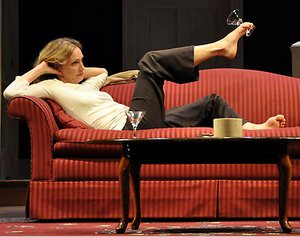
Lisa Emery
(Photo: Jamie Davidson) |
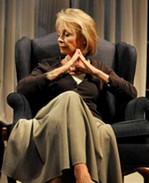
Maureen Anderman
(Photo: Jamie Davidson) |
But don't let the light, comic tone fool you. While you'll find yourself frequently laughing at the script's many incisive, quotable quips, this play, like most of Berkshire Theatre Festival's summer 2010 offerings is serious stuff. True to scenic designer R. Michael Miller's American flag decorative scheme, this is an American family story. Tobias is the family peace keeper and Agnes the one to maintain the standards of civility, or as she puts it "the drill sergeant to keep this family in shape." Yet this is no Father Knows Best comedy but as much a horror story as the more widely acclaimed Who's Afraid of Virginia Woolf.
Like most Albee plays, A Delicate Balance is not a what you see is what you get play, but an enigma to be puzzled out by the viewer. Yet, unlike Beckett's super enigmatic and dour Endgame presented earlier in the season, this production is enjoyable to watch even as the witty chatter before, after (and eventually with breakfast) drinks deepens, darkens and begs post theater thought and discussion. Credit not only the fact that Albee's play holds up quite well but also the astute direction by David Auburn, himself a Pulitzer Prize Winner (Proof), plus a generally solid cast that includes two soaring performances in Maureen Anderman's Agnes and Lisa Emery's Claire.
Auburn has succeeded in bringing out the sense of the ridiculous that informs Albee's humor and seen to it that the audience is entertained by that wit but not at the expense of turning the play into the sort of escapist fare that the author has been quoted as considering a waste of time. And while Albee can be talky so that you wonder whether people really talk like this, Auburn has also seen to it that we pay attention to and catch the undercurrents in the unspoken parts of all that 60s style drawing room patter.
The plot follows the country house weekend formula — the intrusion into the fairly uneventful existence of the home's owners by friends and relatives. The homeowners in this case are Agnes (Anderman) and Tobias (Jonathan Hogan, convincingly patience personified, squabble squasher and drink mixer). Their home feels like upper Westchester where Albee grew up, as an adoptee who never felt truly at home. Agnes and tobias are clearly in comfortable circumstances. Their relationship is a case of many years of togetherness and as it turns out sorrows and losses. The gradually revealed sorrows include a lost infant, a long sexual fast and the a permanent invader in their midst: Agnes's alcoholic sister Claire played by Emery who sets of fireworks whenever she enters the room.
The weekend we spend with Agnes and Tobias sees the return of their much married daughter Julia (Mia Barron, the amusingly petulant "4-purple hearts" marriage veteran) once again seeking succor in the parental home; also the mysterious arrival of best friends Edna (Mia Dillon) and Harry (Keir Dullea) who have been suddenly overwhelmed by a wave of inexplicable fear, which they hope they can lay to rest by moving in with Agnes and Tobias.
The clash of Julia's return and Edna and Harry's arrival explodes the civilized scene that may be seen as a symbol of the dark underbelly of America as something other than a place of universal good will and nurturing relationships. Sisters hate each others (to the point of wishing each other dead) but they are unable to cut the familial bonds. Once meaningful lives become meaningless pits of fear and despair. Children yearn to go home again but discover that home was never the comfort zone of their dreams and needs.
Anderman is wonderfully grand both in appearance and her ability to deliver the lengthy chunks of dialogue she's been given. Elaine Stritch, who played Claire in the 1996 revival that introduced me to this strangely compelling play, may be a hard act to follow. However, Emery, though rather too young for the part, is near perfection as the acerbic but dependent Claire. She's the observer who, true to her name, clearly sees and understands the real meaning of the "plague" that has shown up via Edna and Harry's fear.
The roles of Harry and Edna have always been the weak links in the delicate balance of making the realism and abstraction, the humor and horror come together, in that they are more artificial than the other characters. Neither Mia Dillon or Keir Dullea have quite managed to rise above this inherent unbelievability. Dullea is too much the hail-fellow-well-met country club buddy to reveal any more meaningful subtext and Dillon's Act 3 confrontation with Julia lacks the needed impact.
If, like numerous Curtainup readers who've expressed disappointment in some of the Festival's other choices this season (like its two underwhelming musicals, and a less than memorable Macbeth), don't let that keep you from catching this well worth seeing revival of one of Mr. Albee's prize winning but generally underappreciated plays. I'm certainly glad I had a chance to see it again, and it makes me look forward to seeing his latest, Me, Myself and, when it opens at New York's Playwrights Horizon in just a few weeks.
Production Notes
A Delicate Balance by Edward Albee
Directed by David Auburn
Cast: Maureen Anderman (Agnes), Mia Barron (Julia), Mia Dillon (Edna), Keir Dullea (Harry), Lisa Emery (Claire) and Jonathan Hogan (Tobias).
Sets by R. Michael Miller
Costumes by Wade Laboissonniere
Lighting by Dan Kotlowitz
Music and sound by Scott Killian
Stage manager: Stephen Horton
From August 17 to September 4, 2010
Running Time: 2 hours 4o minutes, including two 10-minute intermissions
Reviewed by Elyse Sommer at August 24, 2010 official opening night
Macbeth-
|
If it were done when 'tis done, then 'twere well it were done
quickly<— Macbeth,
|
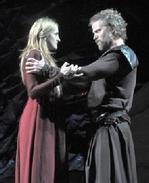
Keira Naughton and C. J. Wilson
|
Eric Hill seems to have used the ambitious Thane's above quoted comment pertaining to the murder his wife urges him to commit as his guideline for staging the Scottish play at BTF's Main Stage. His high speed production appears to have been helmed with a fast-forward button in hand. The result is a Macbeth that tells the tale whose outcome is never in question efficiently but fails to gain high altitude since C.J. Wilson delivers his lines expertly but is not an especially compelling Macbeth. Keira Naughton, who has done some fine work with modern and Chekhov plays, is one of the most underwhelming Lady Macbeths I've ever seen.
As for directorial innovation, Mr. Hill does not disappoint. His three witches are heavily influenced by the Suzuki style associated with most of his work. As played by Elizabeth Terry, Tommy Schrider and Equiano Mosieri these witches are wonderfully weird and eerily mesmerizing. Their Butoh style "dance of darkness" movements are choreagraphed by Isadora Wolfe and provide some of the evening'ss most sensory and exciting moments.
All three witches do double duty in other roles. Schrider, one of the Festival's most outstanding and reliable regulars (Remember hin ub the Einstein Project and in The Caretaker?) is also excellent as the less spooky Rich, one of the various Thanes.
While I would have liked to see the MacDuff of Jeremy Davidson, one of the most successful former BTF interns, Tim McGeever is a very impressive MacDuff and the scene where he learns that his wife and children have been brutally murdered will touch you no matter how often you've seen it. As for the murder of those babes and their mother, Hill has interestingly ramped up the violence and horror of that act by having one of the killers jump up in a body suit. In short, she is not only murdered but brutally raped.
While both the play's ladies end up dead, Brandy Caldwell is a much more lively and engaging Lady MacDuff than Naughton's anemic Lady Macbeth. Another actor who acquits himself outstandingly is Walter Hudson as Banquo, the friend Macbeth murdered but whose children live to take back Macbeth's ill-gained crown..
Joseph Varga's abstract set, is a cross between a stone quarry and leftovers from the mountain from BTF's revival of K2. It turns out to work well as an all-purpose background for the various locations and the characters' frequent less than dramatic entrances and exits. The monochromatic palette is echoed by Olivera Gajic's similarly dark costumes which substitute long black skirts for Scottish kilts. The exception to these semi-soldierly outfits is a rather unflattering blood-red gown worn by Lady Macbeth after she has ascended the coveted throne.
While the elimination of text and scene changes contribute to the brisk pace and dramatic intensity (especially in the second act), it short changes the establishment of Macbeth's character as a noble and honourable soldier before he becomes the victim of his own ambition — and also give Macbeth's Lady a less prominently nasty role. Still, while this presto tempo struck me as a bit rushed and distant, given the superficial character development and mixed bag performances,, the presto tempo is perhaps ideal for this Macbeth.
Production Notes
Macbeth by William Shakespeare
Directed by Eric Hill
Cast (alphabetical order): Brandy Caldwell (Lady Macduff/ gentlewoman), Aaron Costa Ganis (Malcolm), Jesse Hinson (Bloody Captain/ 1st Murderer/ Seton), Walter Hudson (Banquo), Rob Mc Fadyen (Mentieth/ Lord), Tim McGeever (Macduff), Johnnie McQuarley (Lennox), Equiano Mosiere (Witch #3/ Angus/ 3rd Murderer), Keira Naughton (Lady Macbeth), Ralph Petillo (Duncan/ 2nd murderer/ Doctor), Tommy Schrider )Witch #2/ Ross), Elizabeth Terry (Witch #1/ Porter), C.J. Wilson (Macbeth). Scenic designer: Joseph Varga
Costumes: Olivera Gajic
Lighting: Dan Kotlowitz
Dramaturg: William Flesch
Composer/ Sound Design: J. Hagenbuckle
Movement artist: Isadora Wolfe
Stage Manager: Jason Hindelang
August 4 to 14, 2010
Reviewed by Elyse Sommer at 8/07 press opening
|
REVIEW FEEDBACK Highlight one of the responses below and click "copy" or"CTRL+C"
Paste the highlighted text into the subject line (CTRL+ V): Feel free to add detailed comments in the body of the email. . .also the names and emails of any friends to whom you'd like us to forward a copy of this review. You can also contact us at Curtainup at Facebook , Curtainup at Twitter and at our Blog Annex . . . |
BTF Main Stage
The Guardsman
| Do you mean to tell me that you intend to act a part for your wife?. . .that is absurd.— the Critic Quite absurd. . .Every man who loves, and is not loved in return, is absurd.— the Actor |
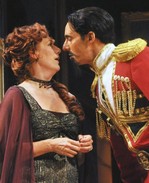
Jayne Atkinson and Michael Gill
(Photo: Sarah Moazeni.) |
Lunt and Fontanne are no longer with us, but the Berkshires Theatre Festival has its own Lunt and Fontanne in Jayne Atkinson and Michel Gill who two summers ago co-starred in a revival of of George Bernard Shaw's Candida (review), also about a marital crisis.. Now they're back for this story of another marriage that could come undone, by Shaw's contemporary. Since Molnar, unlike Shaw who tended to intellectualize and moralize even his "pleasant plays," was not a moralist, The Guardsman has no lessons to impart, no morals to figure out. Instead, it's an easily understood, comic farce about passion and human foibles. With its repartee and the main characters being actors, the husband's ploy of disguising himself as the kind of man he thinks she yearns for, does gently probe questions about the subtle differences between loving and being in love, reality and illusion.
While theater goers who saw Lunt and Fontanne in their prime might balk at crowning Atkinson and Gill as their heirs, both are clearly having the time of their lives. Each capitalizes on the back stage story's possibilities for amusingly overdramatizing themselves. Given their own durable marriage, the necessary chemistry betwen their characters comes naturally.
Granted, the play is unlikely to have you at the edge of your seats wondering whether the jealous husband and the restless wife will end up in each other's arms so that he'll no longer see their upcoming six-months wedding anniversary as portending the beginning of the end. However, there ar plenty of laughs to offset the predictability, especially in watching Gill 's Actor metamorphose into a mustachioed suitor in uniorm and with a heavy accent, and Atkinson's Actress cooly playig her part.
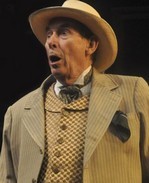
Richard Easton
(Photo: Sarah Moazeni.) |
To add a touch of suave, sophistication there's their friend, the Critic who's more than casually interested in the Actor's fidelity experiment. He's played to perfection by the inimitable Richard Easton who, as far as this critic is concerned , makes any play with him in the cast a command performance.
Another secondary role trned into a major pleasure is that of the Atkinson's "Mama" as zestfully and hilariously portrayed by Mary Louise Wilson (last seen on Broadway as the zany real mama in Grey Gardens , the musicalized story of two eccentric members of the Bouvier family). Two smaller parts are turned into major assets by BTF favorites Tara Franklin and Stephen DeRosa — Franklin as the maid Liesel who's not so secretly enamored of her employer, the Actor; and De Rosa double cast as a Creditor (these Viennese thespians may be stars, but they're obviously not making Hollywood money to support their life style) and an usher during the second act opera scene.
John Rando who's best known for his fast-paced direction of contemporary works proves himself to be quite attuned to this less trendy old-fashioned comedy. He's staged this period piece as written (with two intermission) and with a stylish scenic design and lovely period costumes for the men as well as the women. Alexander Dodge's scenery which includes a gloriously overfurnished and decorated living room for the first and second act, and a terrific opera box and ante-room for the second, and David Murin's costumes are stars in their own right.
With a season that puts the masks of both comedy and tragedy on display, theater goers whose tastes run to more serious fare, there's Beckett's Endgame (review on this page) currently at BTF/s Unicorn Theater and the upcoming Main Stage productions of Shakespeare's Macbeth and Edward Albee's A Delicate Balance.
Production Notes
The Guardsman by Ferenc Molnár
Translated by Grace I. Colron and Hans Bartsch Directed by John Rando
Cast: Jayne Atkinson and Michel Gill as The Actress and the Actor; Richard Easton (The Critic, Dr. Bernhard), Mary Louise Wilson ("Mama"), Stephen DeRosa (Creditor/usher), Tara Franklin (Liesel, the maid).
Sets: Alexander Dodge
Costumes, David Murin
Lighting: Mary Louise Geiger
Sound: Scott Killian
Stage Manager: Stephen Horton
Running time: 2 1/2 hours, including 2 intermissions
From July 13 to July 31, 2010
Reviewed by Elyse Sommer at July 17th press opening
|
REVIEW FEEDBACK Highlight one of the responses below and click "copy" or"CTRL+C"
Paste the highlighted text into the subject line (CTRL+ V): Feel free to add detailed comments in the body of the email. . .also the names and emails of any friends to whom you'd like us to forward a copy of this review. You can also contact us at Curtainup at Facebook , Curtainup at Twitter and at our Blog Annex . . . |
The Last Five Years
| Jamie's over and Jamie's gone./Jamie's decided it's time to move on. —Cathy in her first end-to-beginning "Still Hurting." I've been waiting for someone/ I've been praying for someone./ I think that I could be in love with someone/Like you!— Jamie's hopeful "Shiksa Goddess " when there's still hope for a lasting relationship. |
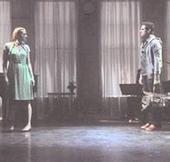
Julie Reiber & Paul Anthony Stewart
(Photo: Jaime Davidson) |
It's easy to understand why this little show has succeeded even though the relationship that it's about is doomed to fail almost from the start. Like I Do, I Do, the much produced Tom Jones and Harvey Schmidt musical about a 50-year marriage. The small cast and minimal orchestral accompaniment makes it as small and intimate as this most popular of theatrical genres can get. As importantly in this tough economy, it's economical to produce. No wonder the Pasadena Playhouse paired the different eras of marriage and music style exemplified by I Do, I Do with Jason Robert Brown's more contemporary, less feel good marital saga of a writer and an actress. The Berkshire Theatre's production gives Mr. Cato, who has heretofore directed only straight plays ( Heartbreak House, The Misanthrope, The Night of the Iguana, to name just a few), a chance to get his feet wet with a a musical and gives star status to a pair of still relatively unknown thespians
Except for a couple of telephone conversations the sung-through plot line alternates between Cathy and Jamie singing songs that give their perspective of the issues that put their marriage on shaky ground pretty much from the get-go. Cathy's 7-song cycle retrospective starts at the end, with her singing "Still Hurting." Jaimie's 7, and usually longer songs, start at the beginning as he proclaims his joy at having found his "Shiksa Goddess." There's just one duet, "The Next Ten Minutes," at midpoint. It's an intriguing and nicely symmetrical concept but it can be distancing. What's more, no matter how well the performers capture the emotional ups and downs corresponding to what stage of their story they're singing about, it's hard to convincingly evoke the chemistry that made Cathy and Jaimie fall in love.
The structural novelty can also be confusing for theater goers arriving too late to read the program notes about the timeline. Consequently, giving The Last Five Years the feel of a real play rather than just two people taking turns standing on stage singing, has been a challenge to the various productions' directors and designers.
The Off-Broadway production featured a wonderfully metaphorical giant stone-like circle that was actually a scrim and which suggested an outdoor wedding chapel, with thirteen (an omen of bad luck?) folding chairs at either side of the walkway for the bride and groom. The set was lit to reflect the changing seasons and also had a moving area on the stage itself for rolling out a variety of other props to illustrate the situations of particular songs. The Philadelphia production provided the most specificity with a semicircular wall covered with frames. Photos embedded into the frames and video images clarified and deepened the events being sung about. A very large free-standing frame opened from half to full frame at the point where the character's stories converge, and then reverted to half a frame again.
Anders Cato's approach reflects his straight play roots. Not that he isn't attuned to the fact that the script he is working with consists of lyrics. After all, he's positioned the five excellent musicians right on stage. His innovation is to keep both actors on stage at all times so that their lack of actual physical contact becomes an interaction, albeit a negative one in that we see them more and more isolated from each other. To accomplish this Cato and designer Lee Savage created a room that would represent the relationship as "a psychological space where the relationship exists inside you long after its over." In line with this, Cato has directed the performers, especially Paul Anthony Stewart, to move around a lot and make use of the main props, a rollout double bed and a desk.
While the set is attractive, Cato's and Savage's intentions don't always work. The performers' movements are at times either distracting or forced. The pale hued room with its sheer curtains somehow seems more suitable for one of the Shaw drawing room plays Cato has done.
Ultimately, of course, a musical is all about the music. That said, The Last Five Years owes much of its continued success to Jason Robert Brown's lively songs. Part of a cadre of contemporary musical theater writers seen as following in Stephen Sondheim's footsteps, Brown, unlike some of his colleagues, writes with an easy listening, pop sensibility. He is at his most Sondheim-ish in his ability to write smart, story-telling lyrics which makes his songs hard to separate from the story, shades of old-fashioned show tunes.
The fact that the BTF main stage is not acoustically ideal for musicals works against doing full justice to Brown's clever lyrics, especially since Julie Rieber , despite a lovely voice, doesn't always project clearly enough for all the lines in especially worth hearing songs like "Climbing Uphill" to be heard wherever one sits. The hyper-kinetic Paul Anthony Stewart's songs suffer from fewer projection problems. The big problem with the show over all is that peppy and quite funny songs like "The Schmuel Song," which tips its hat to Fiddler on the Roof, are cancelled out by the overarching emphasis on gloom and doom. But then didn't Tolstoy imply that happy families being all alike, aren't as interesting and unique as the families that are always unhappy in their own ways.
To listen to a sampling of Reiber and Stewart singing go the the BTF website at http://www.berkshiretheatre.org/shows/lastfive.html#
Production Notes
Written and Composed by Jason Robert Brown
Directed by Anders Cato
Cast: Paul Athony Stewart (Jamie Wellerstein), Julie Reiber (Catherine Hiatt)
Scenic Design: Lee Savage
Costume Design: Laurie Churba Kohn
Lighting Design: Jeff Davis
Sound Design: Janie Bullard
Movement Consultant: Rachael Plaine
Stage Manager Jason Hindelang
Musicians: Rick Bartone-piano; William Hack-bass; Bing Liu-violin; Jonah Thomas-cello; Evan C. I. Randall-Guitar
From June 22 to July 10, 2010 Reviewed by Elyse Sommer based on June 26th press opening performance.
SONG LIST
Note: The song timeline is mirror image style, with Janie's Songs beginning at the end of the five years, and going back to the beginning and Jamie's moving from the beginning forward.
Cathy's Songs: Still Hurting, See I'm Smiling,A Part of That, A Summer in Ohio, Climbing Uphill, I Can Do Better Than That, Goodbye Until Tomorrow/
Jamie's Songs: Shiksah Goddess, Moving Too Fast, The Schmuel Song, A Miracle Would Happen, If I Didn't Believe In You, Nobody Needs to Know, I Could Never Rescue You
The midpoint, joint song: The Next Ten Minutes
|
REVIEW FEEDBACK Highlight one of the responses below and click "copy" or"CTRL+C"
Paste the highlighted text into the subject line (CTRL+ V): Feel free to add detailed comments in the body of the email. . .also the names and emails of any friends to whom you'd like us to forward a copy of this review. You can also contact us at Curtainup at Facebook , Curtainup at Twitter and at our Blog Annex . . . |
Unicorn Shows
Endgame
|
No, I regret nothing, all I regret is having been born, dying is such a long tiresome business. . .—Samuel Beckett Nothing is funnier than unhappiness. Yes, yes, it's the most comical thing in the world. And we laugh, we laugh, with a will, in the beginning. But it's always the same thing.—Nell |
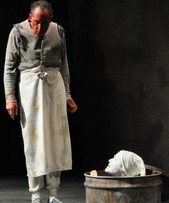
David Chandler as Clov and Randy Harrison as Nagg
|
For one thing, Hill's talents for innovative direction tends to be less attuned to light weight fun fare, than works like The Caretaker by one of Beckett's chief spiritual heirs, Harold Pinter (Review of Hill's terrific summer 2008 production). For another there are the folks who fiercely guard the Beckett estate against any tinkering with his very specific stage directions. And so what you're going to see is an enigmatic, theatrical chess game (the title refers to the last part of the game which the playwright loved, the end part when there are very few pieces left). The 4-actor cast can be likened to those end of game pieces but none are in a position to make that final checkmate move. Hamm cannot see or stand; Clov, the servant he tyrannizes, cannot sit and though he wants to leave he can't seem to do so. Hamm's parents, Nell and Nagg, have no legs and have been put into side-by-side trashcans, like so much refuse waiting for the disposal truck to take them away.
Consider all the above a caveat emptor if challenging plays aren't your thing — especially if they focus on life as a sometimes darkly comic but mostly painful prelude to a too drawn-out death (shades of Beckett's comment at the top of this review stating that his only regret is that he was born since "dying is such a long tiresome business"). But if you don't mind watching a play that you may not quite get (or don't really want to get because it stirs up uncomfortable feelings and laughs), you won't want to miss this — especially if you saw last year's intriguing production of the more often produced but equally enigmatic Waiting For Godot production, also at this venue but directed by Anders Cato (Review ).
Assuming my caveats haven't scared you off, you're in for a treat. Eric Hill and his crafts team have created a stylized production while remaining respectfully true to Beckett's stage notes which call for a barren room with two grimy windows that can only be reached by climbing a ladder. . .for our first view of Hamm to have him sitting in his chair with wheels covered by a rag which, when removed will reveal a bloody hankerchief covering his face. . . the side-by-side trash cans from which a clownishly white-faced Nagg and Nell will pop occasionally are to be near the son who ignores their needs (as they as indicated at one point probably ignored his infant needs).
Though true to the playwright's vision, Hill has given this production a stylized feel that works beautifully with the text. This is especially evident in David Chandler's brilliant almost Chaplinesque Clov and the casting of two young actors — Randy Harrison and Tanya Dougherty — as the old folks, Nagg and Nell. Their ghostly makeup (including missing teeth) and somewhat shaky voices give them an ageless aura and makes their exchanged memories of happier days both touching and more than a little looney.
Dougherty's Nell, though the character with the least visibility, does get the one piece of dialogue that comes closest to summing up, if not the play's definitive meaning, its overall sensibility: "Nothing is funnier than unhappiness. Yes, yes, it's the most comical thing in the world. And we laugh, we laugh, with a will, in the beginning. But it's always the same thing."
Randy Harrison, who was riveting as the unlucky Lucky of BTF's Godot, makes the most of this somewhat less show stealing role. With only his face, his voice and hands available to him, he nevertheless manages to mesmerize.
The two actor's dominating the eerie, claustrophobic space are superb. Mark Corkins makes the helpless Hamm's abiity to keep Clov within range of his constant bullying demands. While there's little doubt that he will get his wish to end his dreary existence, there's still a certain grandiosity about him that lives up to the implied meaning of his name.
As for David Chandler's Clov. . .Wow! Seeing him move about the stage mumbling and grumbling, his every move a major effort, is to see a master class in physical and emotional acting. Watching him bring out the much used ladder for the first time, open it in front of one of the windows, climb up and give a mad sort of laugh as he pulls open the curtain and looks out is a riot. As he repeats this at the other window and keeps doing so again and again, this shtick becomes more sad and poignant than funny.
All in all, this is an absurdist, scary vision of a future where life flies by but also drags, with characters whose misery is so intense that they're memorable. The bits and pieces of conversations may sound meaningless at first, but if you sit back and let the words sink in you'll find the dialogue filled with wit.
Beckett was only 51 when he wrote Endgame, but he'd already seen his entire immediate family pass away. No wonder he was aware of how easily you can find yourself at the end of the game of life, only to realize that you went through it without paying attention or as Hamm says" I was never there. Absent always, it all happened without me." Despite the generous doses of humor, as Nagg won't get the sugar plums he wants, neither can you count on Beckett to sugar coat his grim view of the human condition. The food he dishes up is food for thought and plenty of post show discussion.
Of course, if you took my initial caveats to heart, you may want to fast forward to the Unicorn's next, more light hearted offering, the original let's put on a show in the barn musical Babes in Arms. It has music by Richard Rodgers and lyrics by Lorenz Hart.
Production Notes
Endgame by Samuel Beckett
Directed by Eric Hill
Cast: Clov (David Chandler), Hamm (Mark Corkins), Nagg (Randy Harrison), Nell (Tanya Dougherty)
Scenic Designer: Gary M. English
Costume Designer:– Charles Schoonmaker
Lighting Designer: Dan Kotlowitz
Stage Manager: Laura Wilson
From July 6-25
Running time:About ninety minutes, no intermission.
Reviewed by Elyse Sommer July 12th
|
REVIEW FEEDBACK Highlight one of the responses below and click "copy" or"CTRL+C"
Highlight one of the responses below and click "copy" or"CTRL+C"
Paste the highlighted text into the subject line (CTRL+ V): Feel free to add detailed comments in the body of the email. . .also the names and emails of any friends to whom you'd like us to forward a copy of this review. You can also contact us at Curtainup at Facebook , Curtainup at Twitter |


